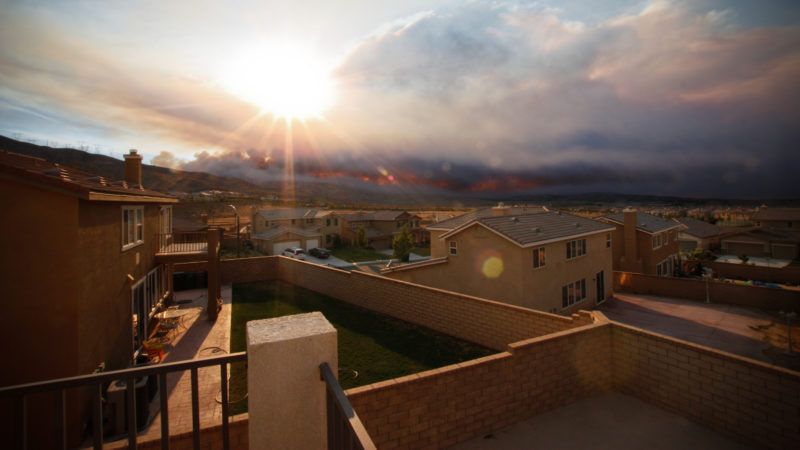California Politicians Double Down on Encouraging People To Live in Wildfire-Prone Areas
The Renew California legislation introduced yesterday would force insurance companies to renew insurance policies in wildfire zones.

California's wildfires are getting deadlier and more destructive each year. Naturally then, state politicians want to make it easier to get insurance in fire-prone areas.
On Tuesday, Assemblymembers Lorena Gonzalez (D–San Diego) and Monique Limon (D–Santa Barbara) introduced Assembly Bill (A.B.) 2367. Their "Renew California" bill would require that insurance companies write new policies or indefinitely renew current ones for existing homes provided they meet yet-to-be-determined state standards for fire-hardening.
Roughly one million homes in wildfire-affected areas are already covered by a one-year moratorium on non-renewals issued by the state's elected insurance commissioner, Ricardo Lara, in December 2019. Lara has endorsed A.B. 2367.
Both the current moratorium and Tuesday's bill are meant to combat the rising trend of insurance companies refusing to renew policies in wildfire-prone areas. Data from the state's Department of Insurance shows that non-renewals have risen by 10 percent in counties affected by 2015 and 2017 wildfires.
"Homeowners who have done all the right things, hardening their homes and mitigating for fire danger, are still seeing their insurance canceled or non-renewed," said Gonzalez in a press release. "We can't allow insurance companies to continue to drop responsible homeowners from San Diego to the Sierras just because they can."
It's possible insurance companies are dropping profitable policies "just because they can." They could also be responding to state regulations that prevent them from raising rates to cover the increased costs of providing insurance in wildfire-prone areas.
In California, proposed rate increases have to be approved by the insurance commissioner. State law also prevents insurance companies from passing on to customers the costs of reinsurance (insurance on insurance), climate change, and other future risks. Third parties can also contest proposed rate increases, which consumer advocates frequently do.
Limited in their ability to raise rates, insurance companies have responded by issuing fewer new policies, and renewing fewer old ones in the riskiest areas of the state. That's created the availability problems so many homeowners are facing now, says R.J. Lehman of the R Street Institute.
A.B. 2367, he cautions, could actually make things worse by encouraging some carriers to stop offering property insurance in California altogether.
"Homeowners insurance is risky. The returns are variable, and there's companies that can just decide we don't want to sell that product in that state anymore," Lehman says, adding that they could content themselves with selling more profitable auto insurance instead.
That's what happened in Florida during the 2000s, where a combination of state limits on rate increases and a string of major hurricanes prompted insurers like Allstate and State Farm to stop offering property insurance in the Sunshine State.
Proponents of the Renew California legislation argue that the bill merely requires insurance companies to not stiff responsible homeowners and communities who adopt the fire-hardening standards the bill would create.
That includes Lara, who said in a press release, that "if you have a fire-hardened home in a fire-hardened community, you should be able to get insurance and keep it."
If these to-be-determined fire-hardening standards did actually reduce wildfire risks, counters Lehman, then the legislation Lara and Gonzalez are pushing would be unnecessary.
"You wouldn't need a bill requiring renewal if the risk was something that an insurance company wanted to take on. You only need the bill because it's an acknowledgment that that mitigation is not enough," he says.
The more California policymakers attempt to obscure the cost of living in wildfire areas, the more property and people will be in harm's way when the next wildfire breaks out.
Rent Free is a weekly newsletter from Christian Britschgi on urbanism and the fight for less regulation, more housing, more property rights, and more freedom in America's cities.


Show Comments (32)